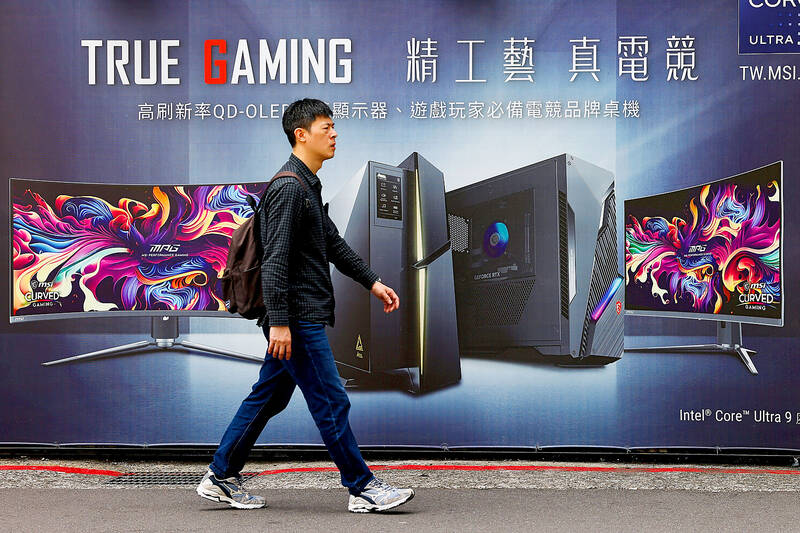The Taiwanese government needs to review its existing import duties on U.S. goods and practices to seek to remove the trade barriers that led to the high reciprocal tariff US President Donald Trump slapped on the country, economists said yesterday.
In particular, the government needs to study a report recently published by the United States Trade Representative, which highlighted issues involving cars, as well as U.S. beef and pork products, Dachrahn Wu (吳大 任), a professor at National Central University’s Department of Economics, told CNA.
According to Wu, the reciprocal tariff of 32 percent Trump announced for Taiwan on Wednesday reflected Washington’s view that Taipei has high trade barriers.

Photo: Ann Wang, Reuters
Taiwan still faces higher tariffs than Trump announced for Japan (24 percent) and South Korea (26 percent), despite the US$100 billion new investment Taiwan Semiconductor Manufacturing Co (TSMC, 台積電) announced on March 3 to expand its American operations, Wu said.
Taiwan’s economy is expected to be impacted as Taiwanese exporters have become more reliant on the US market, Wu said.
In February, the US for the first time in 24 years, became the top export destination of goods from Taiwan, accounting for 28.5 percent of total outbound sales, followed by China and Hong Kong (28.4 percent), Ministry of Finance data showed.
If exports to the US account for a quarter of total exports this year, and exports contribute 60 percent of Taiwan’s GDP, Trump’s tariff will impact 15-20 percent of Taiwan’s GDP this year, Wu said.
The Ministry of Economic Affairs needs to pool resources and see whether steel or petrochemical industries or businesses in the semiconductor supply chain can expand investments in the US to meet Trump’s goal of boosting American manufacturing, he said.
TSMC has said the chipmaker’s investment in Taiwan will not be affected by its expansion in the US, so Wu said the government needs to think about industrial strategies once the semiconductor supply chain is transferred to the US.
The hit on domestic investment could also impact Taiwan’s GDP, making growth of 3 percent more difficult, Wu said.
Meanwhile, Cathay United Bank (國泰世華銀行) chief economist Lin Chi-chao (林啟超) said the Ministry of Finance should consider lowering the 17.5 percent import tax on automobile and 30 percent tariff on health food as bargaining chips in talks with the US.
Lin said it is difficult to reduce the large trade deficit the US has with Taiwan in a short period of time, but buying more US natural gas and oil, increasing US production and having a stronger New Taiwan dollar should help.
The trade deficit the US ran with Taiwan rose 54.6 percent to US$73.92 billion last year, according to data released by the International Trade Administration under the Ministry of Economic Affairs.
Taiwanese businesses that moved production to Vietnam and Thailand will also need to consider how to reposition themselves and the supply chain as the two countries are subject to reciprocal tariffs of 46 percent and 37 percent, respectively, Lin said.

Jensen Huang (黃仁勳), founder and CEO of US-based artificial intelligence chip designer Nvidia Corp and Taiwan Semiconductor Manufacturing Co (TSMC, 台積電) on Friday celebrated the first Nvidia Blackwell wafer produced on US soil. Huang visited TSMC’s advanced wafer fab in the US state of Arizona and joined the Taiwanese chipmaker’s executives to witness the efforts to “build the infrastructure that powers the world’s AI factories, right here in America,” Nvidia said in a statement. At the event, Huang joined Y.L. Wang (王英郎), vice president of operations at TSMC, in signing their names on the Blackwell wafer to

France cannot afford to ignore the third credit-rating reduction in less than a year, French Minister of Finance Roland Lescure said. “Three agencies have downgraded us and we can’t ignore this cloud,” he told Franceinfo on Saturday, speaking just hours after S&P lowered his country’s credit rating to “A+” from “AA-” in an unscheduled move. “Fundamentally, it’s an additional cloud to a weather forecast that was already pretty gray. It’s a call for lucidity and responsibility,” he said, adding that this is “a call to be serious.” The credit assessor’s move means France has lost its double-A rating at two of the

AI BOOST: Although Taiwan’s reliance on Chinese rare earth elements is limited, it could face indirect impacts from supply issues and price volatility, an economist said DBS Bank Ltd (星展銀行) has sharply raised its forecast for Taiwan’s economic growth this year to 5.6 percent, citing stronger-than-expected exports and investment linked to artificial intelligence (AI), as it said that the current momentum could peak soon. The acceleration of the global AI race has fueled a surge in Taiwan’s AI-related capital spending and exports of information and communications technology (ICT) products, which have been key drivers of growth this year. “We have revised our GDP forecast for Taiwan upward to 5.6 percent from 4 percent, an upgrade that mainly reflects stronger-than-expected AI-related exports and investment in the third

RARE EARTHS: The call between the US Treasury Secretary and his Chinese counterpart came as Washington sought to rally G7 partners in response to China’s export controls China and the US on Saturday agreed to conduct another round of trade negotiations in the coming week, as the world’s two biggest economies seek to avoid another damaging tit-for-tat tariff battle. Beijing last week announced sweeping controls on the critical rare earths industry, prompting US President Donald Trump to threaten 100 percent tariffs on imports from China in retaliation. Trump had also threatened to cancel his expected meeting with Chinese President Xi Jinping (習近平) in South Korea later this month on the sidelines of the APEC summit. In the latest indication of efforts to resolve their dispute, Chinese state media reported that